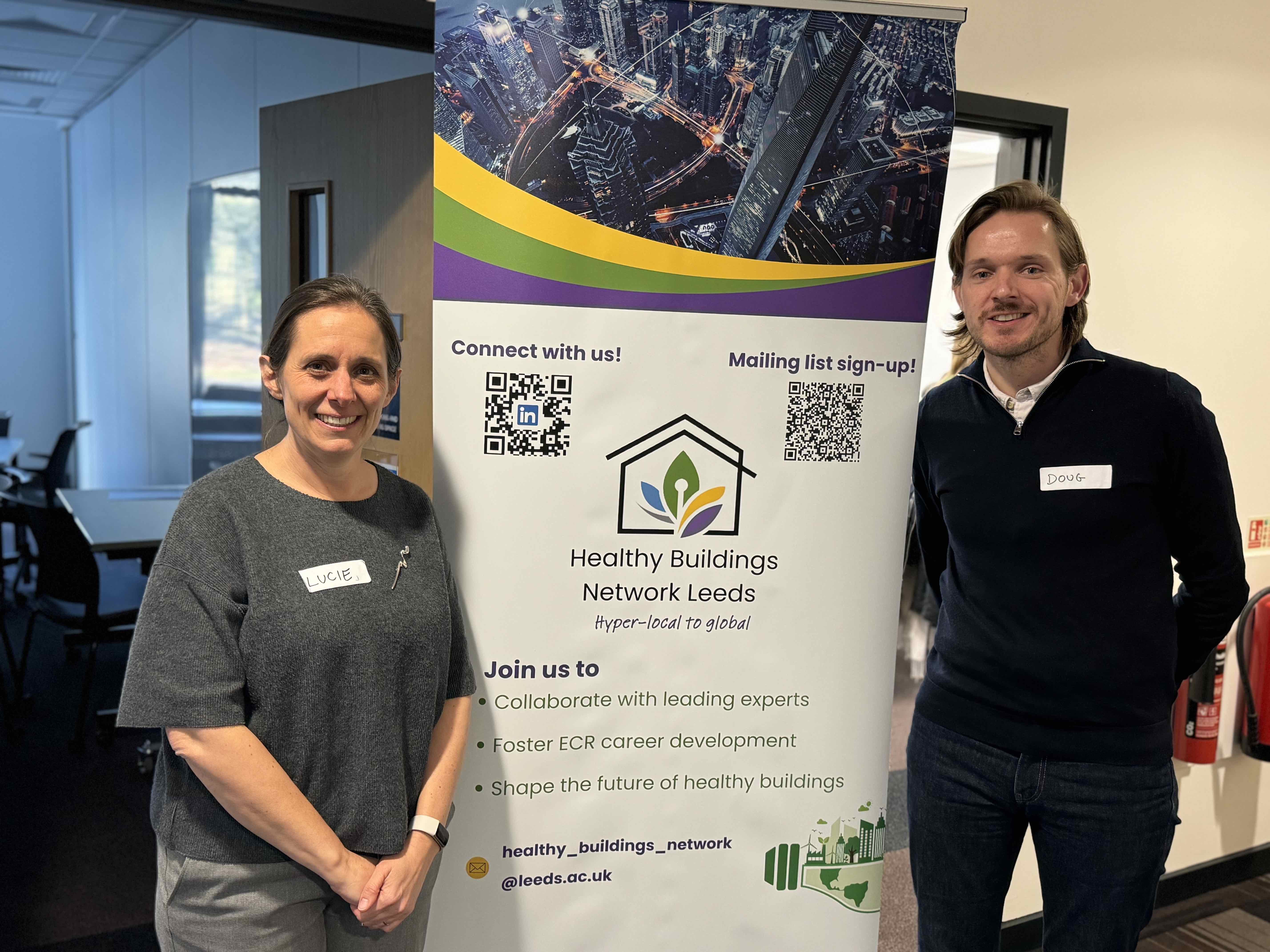A collaborative workshop bringing together researchers to explore the intersection of indoor air quality and energy efficiency in the built environment.

Highlights from our collaborative workshop on Indoor Air Quality and Energy Interface at the University of Leeds.

Dr. Douglas Booker presenting on indoor air quality

Participants in breakout discussion groups

Prof. Lucie Middlemiss discussing energy and healthy buildings
On November 27, 2024, the Healthy Buildings Network hosted a collaborative workshop on "The Indoor Air Quality and Energy Interface" at the University of Leeds. The event brought together researchers from various disciplines to explore the complex relationship between indoor air quality and energy efficiency in buildings.
Exploring the tensions between energy efficiency measures and indoor air quality in the built environment.
Addressing inequalities in access to healthy, energy-efficient buildings across different communities.
Highlighting the need for collaboration between technical and social sciences to develop holistic solutions.
The workshop aimed to identify research gaps and develop collaborative proposals responding to the Healthy Buildings Network's pump-priming funding opportunity. The day featured presentations from leading experts, collaborative breakout sessions, and valuable networking opportunities.
"The built environment plays a pivotal role in driving both climate change and influencing health and wellbeing. While efforts to decarbonise and enhance health outcomes in the built environment are crucial, they often fail to align, leading to conflicts that can exacerbate existing inequalities."
| Time | Activity |
|---|---|
| 9:30am | Registration / Coffee |
| 10:00am |
Kick-off Presentations
|
| 11:00am | Introductions around the room |
| 12:00pm | Lunch and Networking |
| 1:00pm | Breakout Discussion 1 |
| 1:30pm | Feedback |
| 1:45pm | Breakout Discussion 2 |
| 2:15pm | Feedback |
| 2:30pm | Break |
| 2:50pm | Breakout Discussion 3 |
| 3:20pm | Feedback |
| 3:35pm | HBN Network team – Wrap up and next steps |
| 4:00pm | Close |
Presented by Dr. Doug Booker, University of Leeds
Dr. Booker's presentation explored the complex relationships between building design, ventilation strategies, and indoor air quality. He highlighted how energy efficiency measures can sometimes inadvertently lead to poor indoor air quality if ventilation is compromised, particularly affecting vulnerable populations.
Presented by Prof. Lucie Middlemiss, University of Leeds
Professor Middlemiss discussed energy justice and fuel poverty in the context of building design. Her presentation emphasised the importance of considering social equity alongside technical solutions when addressing the energy-efficiency and indoor air quality nexus.
Participants engaged in three focused breakout sessions, exploring different aspects of the indoor air quality-energy interface. These collaborative discussions helped identify research gaps and potential project ideas for future funding applications.
Explored metrics and methodologies for evaluating both energy efficiency and indoor air quality in residential settings.
Examined how research can inform building regulations and energy policies to better protect vulnerable populations.
Identified opportunities for collaboration across different research disciplines to develop holistic solutions.
Several collaborative project ideas emerged, with participants forming working groups to develop proposals for the HBN pump-priming funding.
The workshop successfully brought together researchers from diverse backgrounds to explore the intersection of indoor air quality and energy efficiency. Key outcomes included:
The Healthy Buildings Network will continue to support the collaborations formed during this workshop through:

University of Leeds
Geography / Environmental Science, IAQ, Environmental Justice

University of Leeds
Sociology, Environmental Social Science
Leeds Researchers
External Attendees
Different Disciplines
Early Career Researchers
The workshop brought together a diverse group of researchers from various institutions and career stages, including:
Disciplines represented included environmental science, sociology, engineering, geography, building physics, and public health.
Interested in joining future events on indoor air quality and energy efficiency? Contact the workshop organizers or join our network.
Join Our Network